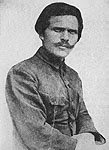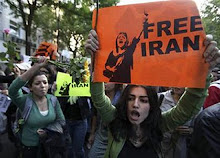Vergangenes Jahr kam an dieser Stelle Tuckers Definition des Sozialismus als Bewegung "wider den Diebstahl" zur Sprache; in gewisser Weise als Fortsetzung davon bringe ich dieses Jahr einen Artikel von Tucker über Anarchie und Verbrechen:
Anarchism and Crime
Mr. B. W. Ball wrote an article in the Index criticizing Anarchism without having familiarized himself with the groundwork of that philosophy. Hence the following reply:
Mr. Ball's central argument against us, stated briefly, is this: Where crime exists, force must exist to repress it. Who denies it? Certainly not Liberty; certainly not the Anarchists. Anarchism is not a revival of non-resistance, though there may be non-resistants in its ranks. The direction of Mr. Ball's attack implies that we would let robbery, rape, and murder make havoc in the community without lifting a finger to stay their brutal, bloody work. On the contrary, we are the sternest enemies of invasion of person and property, and, although chiefly busy in destroying the causes thereof, have no scruples against such heroic treatment of its immediate manifestations as circumstances and wisdom may dictate. It is true that we look forward to the ultimate disappearance of the necessity of force even for the purpose of repressing crime, but this, though involved in it as a necessary result, is by no means a necessary condition of the abolition of the State.
In opposing the State, therefore, we do not deny Mr. Ball's proposition, but distinctly affirm and emphasize it. We make war upon the State as chief invader of person and property, as the cause of substantially all the crime and misery that exist, as itself the most gigantic criminal extant. It manufactures criminals much faster than it punishes them. It exists to create and sustain the privileges which produce economic and social chaos. It is the sole support of the monopolies which concentrate wealth and learning in the hands of a few and disperse poverty and ignorance among the masses, to the increase of which inequality the increase of crime is directly proportional. It protects a minority in plundering the majority by methods too subtle to be understood by the victims, and then punishes such unruly members of the majority as attempt to plunder others by methods too simple and straightforward to be recognized by the State as legitimate, crowning its outrages by deluding scholars and philosophers of Mr. Ball's stamp into pleading, as an excuse for its infamous existence, the necessity of repressing the crime which it steadily creates.
Mr. Ball, - to his honor be it said, - during anti-slavery days, was a steadfast abolitionist. He earnestly desired the abolition of slavery. Doubtless he remembers how often he was met with the argument that slavery was necessary to keep the unlettered blacks out of mischief, and that it would be unsafe to give freedom to such a mass of ignorance. Mr. Ball in those days saw through the sophistry of such reasoning, and knew that those who urged it did so to give some color of moral justification to their conduct in living in luxury on the enforced toil of slaves. He probably was wont to answer them something after this fashion: "It is the institution of slavery that keeps the blacks in ignorance, and to justify slavery on the ground of their ignorance is to reason in a circle and beg the very question at issue."
Today Mr. Ball - again to his honor be it said - is a religious abolitionist. He earnestly desires the abolition, or at least the disappearance, of the Church. How frequently he must meet or hear of priests who, while willing to privately admit that the doctrines of the Church are a bundle of delusions, argue that the Church is necessary to keep the superstition-ridden masses in order, and that their release from the mental subjection in which it holds them would be equivalent to their precipitation into unbridled dissipation, libertinism, and ultimate ruin. Mr. Ball sees clearly through the fallacy of all such logic, and knows that those who use it do so to gain a moral footing on which to stand while collecting their fees from the poor fools who know no better than to pay them. We can fancy him replying with pardonable indignation: "Cunning knaves, you know very well that it is your Church that saturates the people with superstition, and that to justify its existence on the ground of their superstition is to put the cart before the horse and assume the very point in dispute."
Now, we Anarchists are political abolitionists. We earnestly desire the abolition of the State. Our position on this question is parallel in most respects to those of the Church abolitionists and the slavery abolitionists. But in this case Mr. Ball - to his disgrace be it said - takes the side of the tyrants against the abolitionists, and raises the cry so frequently raised against him: The State is necessary to keep thieves and murderers in subjection, and, were it not for the State, we should all be garroted in the streets and have our throats cut in our beds. As Mr. Ball saw through the sophistry of his opponents, so we all see through his, precisely similar to theirs, though we know that not he, but the capitalists use it to blind the people to the real object of the institution by which they are able to extort from labor the bulk of its products. We answer him as he did them, and in no very patient mood: Can you not see that it is the State that creates the conditions which give birth to thieves and murderers, and that to justify its existence on the ground of the prevalence of theft and murder is a logical process every whit as absurd as those used to defeat your efforts to abolish slavery and the Church?
Once for all, then, we are not opposed to the punishment of thieves and murderers; we are opposed to their manufacture. Right here Mr. Ball must attack us, or not at all.
The makers of party platforms, the writers of newspaper editorials, the pounders of pulpit-cushions, and the orators of the stump, who are just now blending their voices in frantic chorus to proclaim the foreign origin of evil and to advocate therefore the exclusion of the foreign element from American soil, should study the figures compiled by the Rev. Frederick Howard Wines from the tenth census reports and presented by him to the congress of the National Prison Association lately held in Boston. Such of these shriekers as are provided with thinkers may find in these statistics food for thought. From them it appears that, though the ratio of crime among our foreign-born population is still very much higher than the ratio among our native population, the former ratio, which in 1850 was more than five times as high as the latter, in 1880 was less than twice as high. And it further appears that, if crimes against person and property are alone considered, the two ratios stand almost exactly on a level, and that the ratio of foreign-born criminals tends to exceed that of native criminals in proportion as the catalog of "crimes" is extended to cover so-called offenses against public morals, public policy, and society. In other words, the percentage of natives who steal, damage, burn, assault, kidnap, rape and kill is about as large as the percentage of foreigners of similarly invasive tendencies, and the percentage of foreign-born law-breakers exceeds that of native law-breakers only because the foreign-born are less disposed than the natives to obey those laws which say that people shall not drink this or eat that or smoke the other; that they shall not love except under prescribed forms and conditions; that they shall not dispose or expose their persons except as their rulers provide; that they shall not work or play on Sunday or blaspheme the name of the Lord; that they shall not gamble or swear; that they shall not sell certain articles at all, or buy certain others without paying a tax for the privilege, and that they shall not mail, own, or read any obscene literature except the Bible. That is to say, again, people who happen to have been born in Europe are no more determined to invade their fellow-men than are people who happen to have been born in America, but that the latter are much more willing to be invaded and trampled upon than any other people on earth. Which speaks very well, in Liberty's opinion, for the foreigners, and makes it important for our own liberty and welfare to do everything possible to encourage immigration.
But, say the shriekers, these foreigners are Anarchists and Socialists. Well, there's some truth in that; as a general rule, the better people are, the more Anarchists and Socialists will be found among them. This, too, is a fact which the tenth census proves.
Now, in what class of foreigners in this country do the Anarchists and Socialists figure most largely? Certainly not among the Chinese or the Irish or the Cubans or the Spaniards or the Italians or the Australians or the Scotch or the French or the English or the Canadians. But these are the only foreigners except the Russians who make a poorer showing in point of criminality than the native Americans. To find in this country any considerable number of Anarchists and Socialists of foreign birth, we must go to the Russians, the Germans, the Poles, the Hungarians, and the Bohemians. The statistics show, however, that the Russians are almost as orderly as Americans, the Germans exactly as orderly, the Poles more orderly, and the Hungarians and Bohemians more than twice as orderly.
Moral: If the defenders of privilege desire to exclude from this country the opponents of privilege, they should see to it that Congress omits the taking of the eleventh census. For the eleventh census, if taken, will undoubtedly emphasize these two lessons of the tenth: first, that foreign immigration does not increase dishonesty and violence among us, but does increase the love of liberty; second, that the population of the world is gradually dividing into two classes, Anarchists and criminals.
Aus der Anthologie Individual Liberty. Selections from the writings from Benjamin R. Tucker, New York, 1926. Hier zum Vergleich der Originalartikel "Where we stand" in Liberty, vol. I, 25, 19.8.1882, S.2.










Keine Kommentare:
Kommentar veröffentlichen